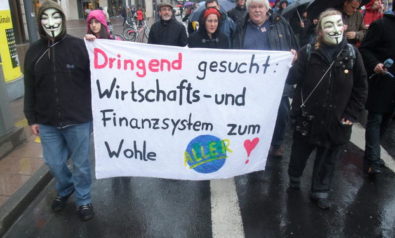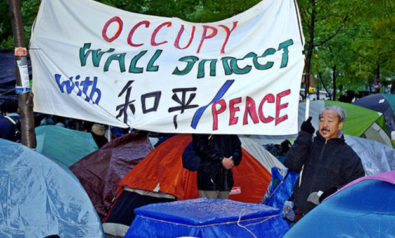An insider’s opinion on Brazil’s apathy to the Occupy movement.
Brazilians seem to have had either little interest, or have greatly misunderstood the purpose of the Occupy Wall Street (OWS) movement. With the exception of a small number of fools like me, excited and involved in the process, who thought it possible to play Don Quixote and win, most people sat idly by their televisions, grappling lazily to understand the frequently incoherent news on TV – a shallow picture of young people camping out in the financial heart of the world’s “capital of cool,” New York City.
Having lived in “the city” for almost a decade, I felt inspired to bring a flavor of the OWS movement to my hometown. Our mayor, charged with numerous counts of corruption and the general misuse of public funding, had been impeached after leaving the city a political and economic mess. For this reason, I felt the necessity to rally everyone I could reach, to organize a peaceful demonstration for the right to vote for substitute mayor before our next elections, and baptized the event ‘Occupy Campinas’. By this, I hoped to regionally adapt the concept of a fight against corporate greed, to one against government greed, here in Brazil.
Thanks to my loyal contact list on Facebook, a meager 30 to 40 people braved the rain and gathered to support the cause I was so committed to. We risked looking like a group of demented hippies, though with much less colorful clothing.
Eager to spread the word and mobilize more of our citizens to help themselves, I wandered around bars close by, where a crowd of young to middle-aged people had chosen to observe us from afar (so they wouldn't have to put down their drinks). I urged them to sign the petition that would restore their democratic rights. At the end of the day, we had only managed to collect 200 signatures.
Television showed similar demonstrations by others grouped in churches and squares, engaged in attempts as insignificant as our own to raise awareness.
Where were the people with painted faces that flooded Brazilian streets in the ‘80s, clamouring for “Diretas-Já” (direct elections), benchmarking the end of a 20-year long transition from military dictatorship towards democracy?
It might be that a more urgent local anti-corruption movement had just bubbled up. A law had recently been drafted forbidding politicians facing corruption charges from running for elections. Still, since Brazil had been abused and exploited with such greed since its colonization, why didn’t the OWS movement strike a louder chord in this society? What could be the reason for our lack of sensitivity to a plea so familiar?
In order to better comprehend the incongruence of the Brazilian reaction to the OWS movement let us retrieve some information on Brazil’s recent history.
Since Lula’s presidency (2003-2010), low income workers have been ascending dramatically, disseminating a widespread feeling that Brazil has become that country of the future long predicted by generations before, bringing the people to experience the “Brazilian dream” for the first time. And who wants to forfeit a dream?
In Brazil, government officials depicted the financial tsunami and all of its impact, as a small tidal wave that would provoke nothing but a small vibration. Though the country’s banking system is one of the widest spread in the world, its masters are not accustomed to taking unsafe bets, and deny loans to anyone who doesn’t seem capable of paying back the loan with at least 10% monthly interest. For that reason, during the global financial crisis, Brazilians were theoretically protected. To further distract customers and national corporations and keep them dreaming, the government temporarily lowered or zeroed taxes on purchases of new cars and home appliances, boosting government approval despite the administration’s ongoing battles with numerous charges of corruption. Brazil was finally able to clean up its act with the International Monetary Fund, catapulting the country to the position of money lender and forging an image of an influential international economic player, and in doing so, feeding Brazilian nationalistic pride.
Previous attempts to transform the Brazilian image into a more wholesome one have touched on the issue of education. In an effort to lower the country’s illiteracy rate, a legislation signed by president Cardozo prohibited any student from repeating a grade, no matter how unprepared they were to move ahead. This has had an indirect but possibly fundamental influence on the people’s capacity to perform complex analyses and rationalizations.
The habitual coexistence between corruption scandals and news of economic prosperity in Brazil might have also played a role in the desensitization of its people, keeping them from outrage, and constructing a social and political gray zone of thought in relation to financial growth and general development.
Rui Barbosa, the renowned legislator responsible for writing Brazil’s first constitution, said: “After seeing nothingness prevail, after seeing the dishonor successful, after seeing the lack of justice grow. After seeing the power growing in the evil one’s hands, the human being is discouraged of his virtue, laughs at honor and feels ashamed for being truly honest.”
Brazil is still in the stone ages of capitalism, and deals with a fundamentally uneducated people easily entertained by public stunts and lacking any real interest in science and innovation. The people follow outdated concepts, where they don’t know any better, where they don’t question how the rich make their money, as long as they can dream, dream, dream.
I suspect that Rui Barbosa’s wisdom, prophetically, has become a portrait of the general Brazilian sentiment. Sadly, it seems that proximity to the established power is a more promising course than fighting it, here in a world where money is an Absolutist King, ultimately capable of undermining all the impact a movement like OWS could have.
The views expressed in this article are the author's own and do not necessarily reflect Fair Observer’s editorial policy.
Support Fair Observer
We rely on your support for our independence, diversity and quality.
For more than 10 years, Fair Observer has been free, fair and independent. No billionaire owns us, no advertisers control us. We are a reader-supported nonprofit. Unlike many other publications, we keep our content free for readers regardless of where they live or whether they can afford to pay. We have no paywalls and no ads.
In the post-truth era of fake news, echo chambers and filter bubbles, we publish a plurality of perspectives from around the world. Anyone can publish with us, but everyone goes through a rigorous editorial process. So, you get fact-checked, well-reasoned content instead of noise.
We publish 2,500+ voices from 90+ countries. We also conduct education and training programs
on subjects ranging from digital media and journalism to writing and critical thinking. This
doesn’t come cheap. Servers, editors, trainers and web developers cost
money.
Please consider supporting us on a regular basis as a recurring donor or a
sustaining member.
Will you support FO’s journalism?
We rely on your support for our independence, diversity and quality.








Comment